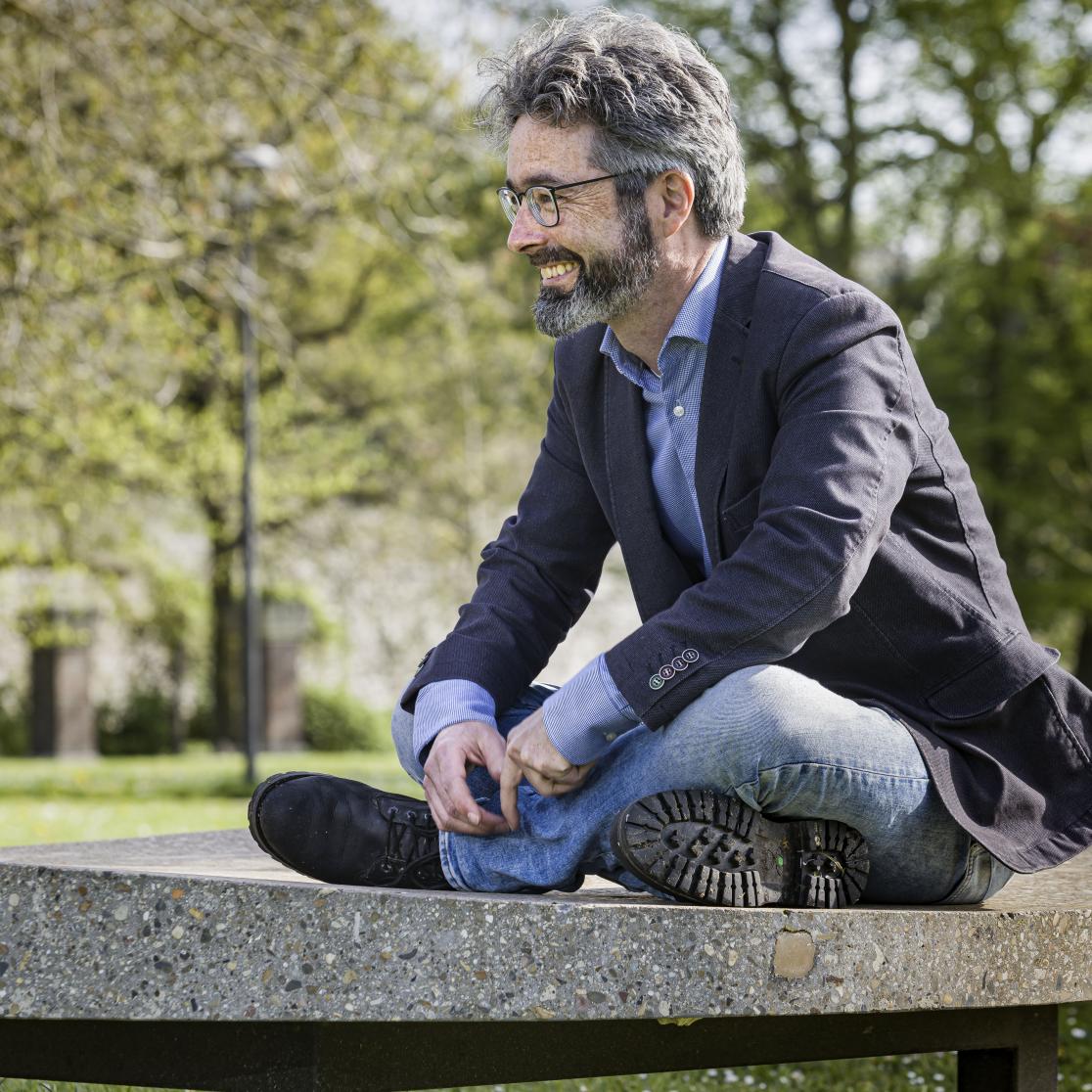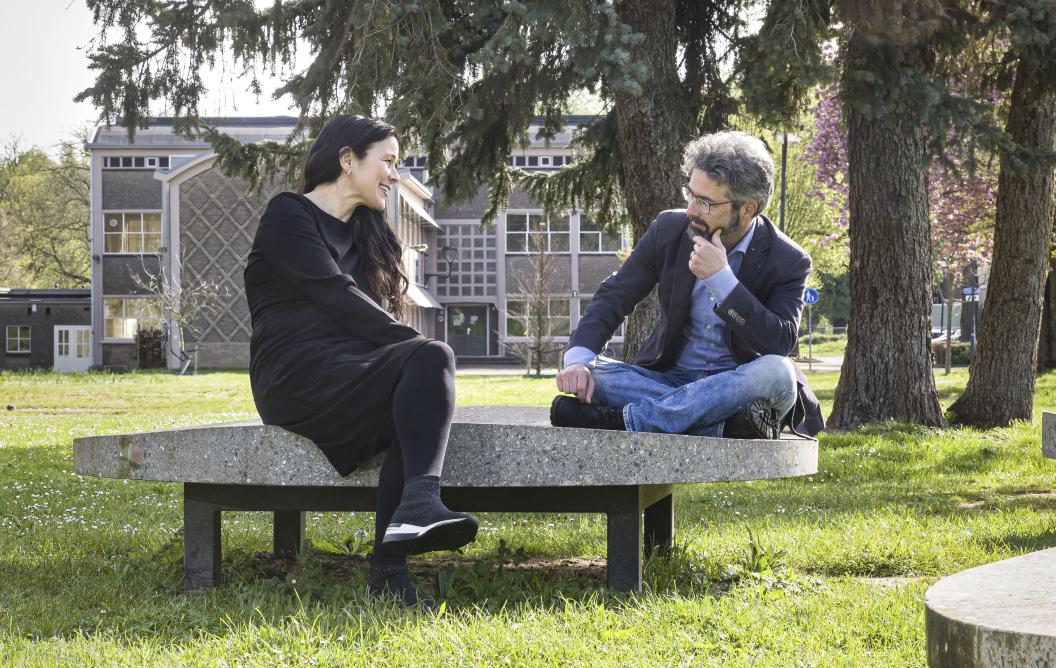The Regional Transition Platform
The recently launched Regional Transition Platform aims to help accelerate sustainability transitions in the region. The platform focuses mainly on knowledge exchange in a participatory setting. Experiential knowledge of the Maastricht municipality is linked to the academic knowledge of Maastricht University. Other institutions in the region will also be involved. The intention is to help and strengthen each other to move forward sustainably. We speak to Nicole Rijkens of Maastricht University and Erwin de Bruin of Maastricht municipality. Together, they coordinate the platform to, as they put it themselves, "ensure that meaningful steps are taken."
The beginning
"The platform was born out of a need to anchor more in the region with our sustainability knowledge," Nicole explains. "The idea of a platform had existed at the Maastricht Sustainability Institute for some time. Mainly to help the region accelerate on those sustainability transitions with the knowledge being developed here at UM. So it's actually a kind of knowledge interface." She continues: "Two years ago, we developed the platform in co-creation with various people from the region and from UM. This process was financially supported by Sustainable UM 2030. Important question at the time was: What knowledge and knowledge match do we need to accelerate transitions and what role can a platform take in this?"
Matching academic knowledge to practical knowledge
Erwin and Nicole met during one of the transition platform's first exploratory sessions. Nicole: "Thanks to the sessions, we also know what to expect from each other. In which knowledge certainly comes not only from UM, but also from other knowledge institutions and companies, governments, civil society organisations and residents in the region."
Erwin cites a good example of how knowledge and practice can be matched: "Municipalities have the task of dealing with climate change, such as getting buildings off the gas, dealing with flooding and heat stress. We cannot do this alone and are looking for ways to increase the self-organising power of our residents. For example, the transition is also accompanied by a ‘creeping’ crisis called grid congestion. We see it happening but do not know how, when and to what extent it will manifest itself in the coming time. These are examples where you can combine the academic brainpower with a government and institutions that need to put it into practice. And here you can also see that the region is watching."
The platform is primarily a knowledge-exchange platform, but with a focus on practice. So not just sitting in a meeting room, but actually getting to work on the transitions.
Nicole RijkensThemes: energy transition, circularity and resilience
In order for the platform to grow from content, they chose to work with different themes. Currently, the focus is on three themes: strengthening citizen participation in making the city more sustainable (energy transition), closing material and food flows (circularity) and strengthening resilience and cohesion in neighbourhoods in the face of disruptions. Erwin: "We deliberately want to start small. So from a focus on a few specific topics, we hope the platform will start to show its value and then other themes can be grasped with new partners."
Let's help each other look broadly, exchange perspectives and hold a mirror up to each other. That is exactly what the platform can do.
Erwin de BruinThe platform in practice
Once it was decided that the Regional Transition Platform had to be established, the question arose: Where to go from here? Nicole: “The platform is primarily a knowledge-exchange platform, but with a focus on practice. So not just sitting in a meeting room, but actually getting to work on the transitions. Doing some action research, so that you see what happens in practice and learn from it. And vice versa, that you let the practitioners know what you’re up against and can say: ‘Help, I need knowledge about this.’ This way, we can strengthen each other.”
For now, Nicole and Erwin want to show and try out what works best. What can you achieve with the platform and who do you reach with the platform (and who not). Erwin: "Everyone is working on sustainability transitions. It is a waste if the wheel is invented in many places, independently of each other. Regional cooperation works more efficiently and effectively."
From the region to the Euregion
The Regional Transition Platform must add value to the region. For the various sustainability transitions going on at the moment, Maastricht municipality and Maastricht University are also looking at their neighbours, think of the Sittard-Geleen municipality and Parkstad, and for some themes you have to look across the border as a border province. Nicole: "Region for me is also Euregio, so we are also in contact with our knowledge partners on the German and Belgian side."
Activities
For the coming year, Nicole and Erwin will ensure that the platform keeps evolving. Erwin: "We need to make sure that for all these three themes, a research or knowledge exchange is done by the end of the year.’ Nicole: ‘Before the summer, we have an event on shocks (such as climate shocks, a new infectious disease outbreak, a biodiversity crisis etc) and the resilience of the region."
Erwin says: "We are also critical of the platform and its functioning. What can we achieve with it? We also want to get a grip on the impact of the platform in the coming period." Nicole adds: "What you actually want is to influence the agendas of actors, so that they start looking at issues in a different way and implement that in their own companies or institutions and seek new collaborations. However, these are very complicated processes that are difficult to measure."
Future vision
Nicole and Erwin have plans for the platform that should only benefit cooperating parties. As a vision for the future, Erwin says: "Let's help each other look broadly, exchange perspectives and hold a mirror up to each other. That is exactly what the platform can do."
Organisations in the region, as well as colleagues at Maastricht municipality and UM who want to get involved with sustainability transitions via the Regional Transition Platform, can approach the platform.
Text: Sandy Langenhuizen, Sustainable UM 2030
Pictures: Paul van de Veer

Erwin de Bruin works as Cluster coordinator Sustainability for the municipality of Maastricht. The biggest task that Erwin is working on is making Maastricht natural gas-free in order to comply with the climate agreement by 2050. Furthermore, the organisation itself aims to be climate-neutral by 2030.
Also read
-
Andrés Caceres Solari on No room for Human Rights in Gaza and Ukraine: How the Law Legitimizes Urban Devastation
Pick Our Brains Session with Andres Caceres Solari

-
AMIBM hosts the final Realise-Bio conference
The Aachen Maastricht Institute of Biobased Materials (AMIBM) hosted last week the third and final Realise-Bio annual conference, bringing together the Dutch and German bioeconomy ecosystems at the Brightlands Chemelot Campus.

-
Macrophages as key to treating liver fibrosis
Sabine Daemen is researching how certain macrophages can slow down fatty liver disease and fibrosis in order to develop new therapies.

